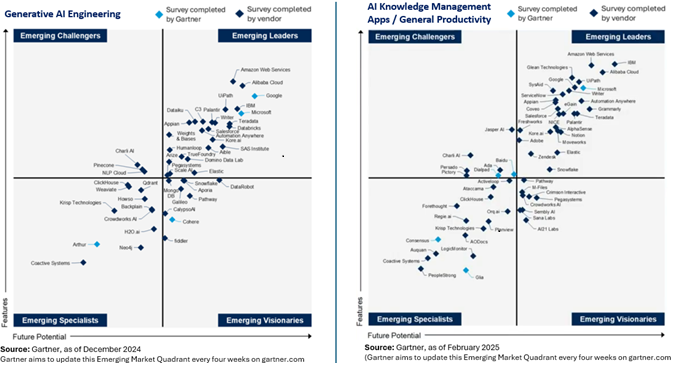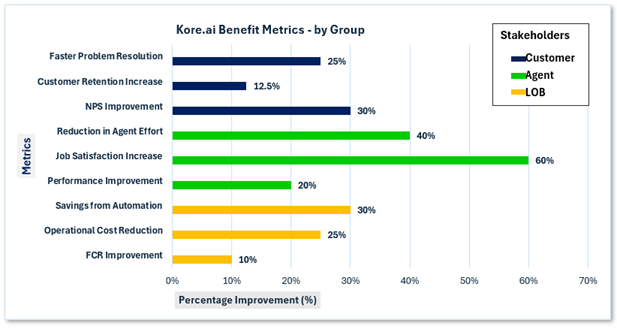Optimizing Conversational and Generative AI for Seamless Customer Experience
Adam Geffner, Head of Global Contact Center Transformations, Mphasis
Conversational and Generative AI have evolved far beyond basic visual IVR systems and scripted responses, becoming essential tools for delivering seamless, personalized, and interactive customer experiences. These innovations are now critical across industries such as retail, finance, travel, and healthcare.
By combining Conversational AI's ability to understand customer intent with Generative AI's dynamic, context-aware responses, businesses can enhance customer engagement across both digital and human touchpoints. However, achieving a truly seamless omnichannel experience-one that prevents disruptions and maintains continuity-depends on the sophistication of AI solutions and their strategic implementation.
Despite significant progress, challenges remain. Real-time voice responses, particularly those requiring instant translation, personalization, and handling complex queries without human intervention, still present hurdles. While large language models (LLMs) and generative AI have made notable strides in addressing these issues, further refinement is needed to ensure greater accuracy, efficiency, and contextual awareness.
The Evolution of AI in Customer Experience
Conversational and Generative AI have transformed customer support by utilizing Natural Language Understanding (NLU), Natural Language Processing (NLP), and Machine Learning (ML). These technologies enable businesses to deliver instant, accurate responses and highly personalized recommendations, enhancing customer experiences across industries.
Mphasis, in collaboration with leading AI providers, offer industry-specific AI solutions focusing on the CX and EX needs in Banking, Healthcare, and Retail. These services leverage pre-trained machine learning models designed to address sector-specific challenges.
- In retail, RetailAssist boosts online sales by 50% through AI-driven product recommendations and increases the average shopping cart value by 2.5x via upselling and cross-selling.
- HealthCare's Generative AI securely accesses SOR data, comparing member or provider policies to offer insights across multiple languages, ensuring accurate health information for diverse populations.
By enhancing customer satisfaction, reducing costs, and improving operational efficiency, these AI-powered solutions give businesses a strong competitive edge in an increasingly digital marketplace.
Enhancing AI with Prompt Optimization and Intent Recognition
Advancements in Conversational AI are being driven by innovative techniques in prompt engineering and intent recognition. These improvements enable AI to handle complex queries more efficiently and accurately, leading to significant gains in automation and customer experience.
For example, a U.S. telecom provider managing 370 million customer interactions annually achieved a 20% increase in voice automation and saved $140 million over three years by implementing AI-driven solutions.
Mphasis utilizes multi-algorithmic intent engines that integrate machine learning, knowledge graphs, and industry-specific ontologies. This approach reduces reliance on extensive training data while maintaining high precision, making AI solutions more scalable and effective across various industries.
Achieving Omnichannel Continuity and Real-Time Context Retention
Delivering a seamless omnichannel experience is crucial for engaging today's customers and reducing friction across touchpoints. AI-driven real-time context retention ensures smooth transitions between channels-whether from website chat to a mobile app or a live service call-eliminating repetitive interactions and enhancing overall satisfaction. This continuity helps businesses reduce Average Handling Time (AHT), minimize digital leakage, and improve key performance and operational metrics.
In consumer electronics, AI solutions streamline workflows by automating product manual creation, refining web content, and designing targeted campaigns, reducing manual effort while maintaining relevance. In e-commerce and logistics, real-time order tracking enhances customer trust and helps prevent cart abandonment.
By integrating multiple channels into a cohesive, AI-powered experience, businesses not only exceed customer expectations but also improve retention rates through hyper- personalized interactions at every stage of the journey.
Human-in-the-Loop (HITL) for Enhanced Agent Support
Mphasis enhances customer support using a Human-in-the-Loop (HITL) approach, blending AI efficiency with human expertise to provide personalized, accurate resolutions. AI handles routine queries, while complex cases are elevated to human agents, ensuring precision and tailored assistance. HITL also empowers agents with next-best-action guidance and interaction summaries, helping to reduce AHT and improve First-Call Resolution (FCR).
In financial services, AI assistants quickly address basic inquiries, such as account balances and transactions, while elevating investment or advisory-related questions to a financial expert. Beyond automation, AI-driven sentiment analysis and empathetic response capabilities enhance engagement by making interactions feel more human-like. This also improves agent routing, ensuring users are seamlessly transferred to live agents when needed.
Mphasis further refines AI-driven conversations with Neural Text-to-Speech (NTTS) technology, which mimics human speech patterns-capturing pitch, rhythm, and intonation for natural-sounding interactions. Combined with sentiment analysis and empathetic response mechanisms, NTTS improves user experience, boosting self-service adoption and reducing unnecessary escalations.
Advancing Agentic AI and Minimizing Hallucinations for Trusted Customer Interactions
Agentic AI marks a major shift in how organizations use AI to enhance customer experiences. Unlike traditional AI which follows predefined rules, Agentic AI functions autonomously, making context-aware decisions; adapting in real-time. This allows for hyper-personalized interactions, where AI agents not only respond to queries but also anticipate user needs and optimize experiences based on continuous learning and multimodal inputs.
By seamlessly integrating with Conversational and Generative AI, Agentic AI improves real-time decision-making and delivers scalable, personalized interactions. For example, Mphasis virtual agent can resolve billing inquiries by pulling data from multiple systems, analyzing transaction history, and providing tailored solutions-all without human intervention.
However, as AI takes on more responsibility, a key challenge remains: minimizing hallucinations-where AI generates irrelevant or incorrect responses. This is especially critical in precision-driven industries like healthcare, finance, and legal services, where trust and accuracy are paramount.
To address this, large language models (LLMs), which may exhibit hallucination rates between 1.3% and 4.1%, require continuous refinement. Mphasis mitigates these risks through model fine-tuning, advanced training techniques, high-quality datasets, and real-time validation mechanisms. Additionally, responsible AI frameworks help build trust by enabling AI to recognize its limitations and escalate uncertain queries to human agents. Enhanced response controls now allow AI to acknowledge when it lacks sufficient data, responding with "I dont know" rather than generating unreliable answers.
Evolution to Agnostic AI Agents
Building on these advancements, AI virtual agents have evolved into Agnostic AI agents; capable of operating across diverse platforms and ecosystems. These agents unify customer interactions across multiple tools and channels, such as social media, messaging apps, and in-person engagements. Frameworks like LangChain enable developers to integrate LLMs into workflows, breaking down complex tasks into manageable steps and processing them sequentially for cohesive responses. This empowers bots to handle multifaceted requests, even when solutions span multiple AI systems.
The effectiveness of AI agents is reflected in tangible, measurable improvements. When organizations leverage Mphasis AI powered solutions, they can expect the following outcomes:
-
For customers:
-
25% faster problem resolution, leading to quicker support and improved CSAT.
-
10-15% increase in customer retention, fostering longer-lasting relationships.
-
30% improvement in NPS, driven by personalized seamless experiences.
-
For agents:
-
40% reduction in workload, allowing agents to focus on more complex tasks.
-
60% increase in job satisfaction, as AI reduces stress and enhances productivity.
-
15-25% performance improvement, enabling faster and more effective query handling.
-
For business leaders:
-
30% cost savings through self-service automation, reducing manual intervention.
-
20-30% lower operational costs, driven by streamlined processes and AI-driven efficiencies.
-
10-15% increase in FCR, ensuring faster issue resolution with fewer escalations.
By ensuring interoperability, agnostic AI agents streamline customer journeys and improve operational efficiency in complex environments, all while achieving significant business outcomes.
Ensuring Ethical Practices in AI
As AI continues to evolve, ethical challenges such as bias in decision-making, data privacy risks, and automation errors remain critical concerns. Addressing these issues is essential to building customer trust and ensuring the responsible, sustainable adoption of AI solutions.
Mitigating AI Bias
Bias in AI often originates from training data that reflects existing societal inequalities. For example, an AI-powered recruitment system trained on biased datasets may unintentionally reinforce demographic preferences. To counteract this, Mphasis employs bias-detection mechanisms during both training and live operations, ensuring fairness and inclusivity. Its AI-driven recruitment solutions leverage diverse datasets and real-time validation to promote equitable candidate selection.
Strengthening Data Privacy and Security
Data privacy is a major concern, particularly in industries like banking, healthcare, and finance, where sensitive information must be securely managed. The 2019 Capital One breach, which exposed over 100 million customer records, highlights the potential consequences of insufficient security measures.
To mitigate these risks, Mphasis integrates industry-leading security protocols:
- AES-256 encryption to safeguard application data at rest and during transmission.
- HSM-managed cryptographic keys, allowing administrators to rotate and manage encryption keys securely.
- Compliance with global privacy standards, including GDPR, CCPA, SOC 2, and ISO 27001.
Ensuring Transparency and Ethical AI Governance
- Responsible AI frameworks must prioritize transparency and accountability. Mphasis incorporates built-in auditing mechanisms, enabling organizations to:
- Regularly evaluate AI performance to maintain ethical alignment
- Utilize real-time dashboards for visibility into AI decision-making processes.
- Identify and mitigate risks early, ensuring AI operates within ethical and legal boundaries.
- By combining strong privacy protections, proactive bias mitigation, and AI transparency, Mphasis sets a high benchmark for responsible AI practices, ensuring secure, fair, and ethical AI adoption.
Mphasis's Edge in the Evolving Generative AI Landscape
The future of customer experience is increasingly shaped by Generative AI, with Mphasis and Kore.ai playing a key role in driving this transformation. Recognized by Gartner as a leader in Generative AI Engineering and GenAI Applications, Kore.ai’s solutions help businesses scale AI capabilities while improving interaction quality and contextual relevance. Mphasis leverages these innovations to enhance customer engagement and drive operational intelligence through enterprise-ready AI solutions.
Leading solutions like Microsoft’s CoPilot, Salesforce AgentForce and CCaaS platforms such as Genesys, Five9, Talkdesk, and AWS are making significant strides in advancing AI-driven customer engagement. Each platform brings unique capabilities tailored to different business needs, contributing to the expanding AI ecosystem.
Mphasis, in collaboration with its partners takes a comprehensive and integrated approach to AI adoption. By combining advanced AI technologies with deep industry expertise, we deliver end-to-end solutions—from initial design and seamless integration to continuous optimization and scaling. This approach empowers businesses to navigate AI adoption with confidence, unlocking both immediate benefits and long-term strategic value in a rapidly evolving landscape.
Highlighting the broader impact of AI, McKinsey forecasts that AI technologies could contribute up to $4.4 trillion annually to the global economy. As AI continues to enhance productivity and customer satisfaction, Mphasis is positioned to help enterprises fully harness Generative AI’s potential. Through its partnership with companies like Kore.ai, solutions can be delivered that not only address current demands but also adapt to future technological advancements.

|
Conclusion
The convergence of Conversational and Generative AI represents a turning point in customer engagement. These technologies go well beyond answering questions. Bridging the gap between automation and human connection. These technologies anticipate needs, personalize interactions, and drive operational efficiency at scale.
Enterprises leveraging next-gen AI models can predict trends, adapt in real-time, and enhance customer experiences, turning AI into a strategic advantage for sustained growth.
Advancements in Agentic and Agnostic AI enable real-time decision-making and hyper-personalization while ensuring ethical AI governance, particularly in regulated industries like finance and healthcare. Organizations are implementing bias detection, encryption, and transparency frameworks to maintain trust and compliance with global standards.
With AI expected to contribute up to $4.4 trillion annually to the economy, businesses must invest in scalable, secure AI solutions. Strategic partnerships, such as Mphasis and Kore.ai, provide end-to-end AI adoption, ensuring both immediate efficiency gains and long-term growth.



